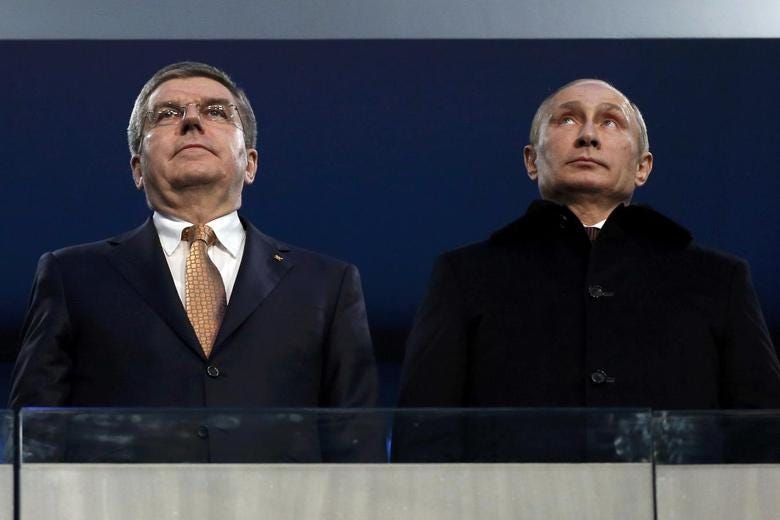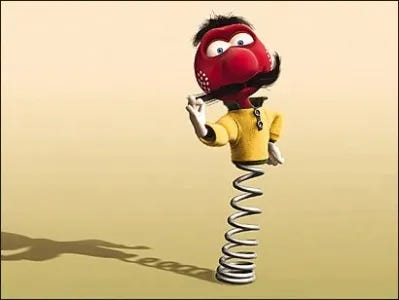Second in the table of overall medals won isn’t half bad for a nation denied a place at Beijing 2022. Russia has taken us all for fools. You if you watched any of the Games. Me for doing just that. All the sporting politicians who allow Russian athletes to compete. The greatest fool of all is Thomas Bach, the spineless IOC president sucking out the soul of the Olympics.
It’s all very well for Bach to say he was “chilled’ by the sight of child skater Kamila Valieva being berated by her coach after stumbling out of the medals. He might also be frustrated that the Court of Arbitration for Sport forced the IOC to allow her to compete in spite of a failed drugs test. But none of this would have happened were it not for Bach’s cretinous creation of a Russian Olympic Committee team.
No Russian flags or anthems? Pah! The kit is still red, white and blue, the team management is Russian, and Vladimir Putin will still hang out the bunting when his medallists return home - just as he did after last year’s Games in Tokyo.
The first rumblings of truly widespread Russian doping that I heard came in the months ahead of the World Athletics Championships in Moscow in 2013. Athletes from other nations began to grumble that the Luzhniki Stadium would reverberate to the State Anthem of the Russian Federation for Russians who would later be stripped of their medals. And so it transpired. Russia ‘won’ seven golds and topped the table. Today, the ranking from those championships shows only three remain.
“The Russians have nearly 40 athletes serving drugs bans. That really is terrible. To then give them a major championships… should you reward people that clearly have a problem?” Long jumper Greg Rutherford in May 2013
The track & field Worlds were just a warm-up for Russia’s systemic doping at the Sochi 2014 Winter Olympics. The scandal was blown open by a whistleblower only months after these Games. But Russia still tops this medal table. It was stripped of 14 medals, but CAS reinstated 11 of them on appeal.
And so began the sordid dance to accommodate Russian athletes. I watched it from within athletics. In the summer of 2015 I was asked by a senior official at the IAAF (now World Athletics) to spend time with the General Secretary of the Russian Athletics Federation, Mikhail Butov, who was in London for our Diamond League meeting, to explain how we handled doping education in Britain. I smelt a PR bear trap and managed to swerve the request.
Later that year, once the Pound Report had laid bare the extent of Russia’s corruption, I badly fractured my own relationship with Seb Coe and the leadership of the IAAF by loudly calling them out for their tardiness in addressing the situation. Chalk up another small victory for the Russians.
Eventually, Coe and colleagues ground into action. Their athletics solution has been to subject individual Russian athletes to drugs testing programmes independent of RUSADA, their country’s anti-doping agency, to enable them to compete under a neutral banner.
This has never sat easily with me, although I acknowledge the moral dilemma of balancing the rights of innocent individuals against the sins of the state. It has also backfired on World Athletics who are attempting to manage the Russian Athletics Federation back into the fold but are hampered at every turn by obfuscations and insults. If Russian athletes were denied any world stage, wouldn’t the imperative to cooperate prove far stronger?
Better this approach, however, than simply re-badging Russia as the ROC as the IOC has done. The Valieva affair serves to emphasise just how deeply the Russian poison has seeped. Who’d have thought drugs would help a figure skater? But think of the hours and hours of practice that the attainment of excellence requires. Just as drugs can help a sprinter or weightlifter to train twice a day at high intensity, so they might enable a teenage skater to spend longer productive time on the ice.
Of course we wait to see whether Valieva’s results in Beijing are allowed to stand - and the lawyers may ensure that wait is a long one.
Who cares what effect such a regime might have on a young athlete’s mind or body? Not every individual in her entourage it would appear - can’t believe she sourced the drugs herself - nor RUSADA or even CAS. The IOC has forfeit its right to indignation on her behalf in creating the framework that allowed her to compete.
“There were ten days of hell, during which adults and seemingly respectable people from the Western media and the IOC drowned this fragile genius. And they did it for no obvious reason - simply on the basis of unproven suspicions and banal politics." Columnist in Russia’s Sport-Express on Kamila Valieva, as reported by USA Today
The boldest response to the Russian doping scandal came from the then president of the International Paralympic Committee, Philip Craven, who engineered an outright ban of Russia from the Rio Paralympics in 2016. Thomas Bach’s response was to boycott these Paras, not-so-subtly underlining the IPC’s dependence on big brother IOC (and the IPC was quick to say it didn’t feel snubbed, so probably was). Craven’s successor has since created an RPC to mirror the ROC, and so here too a big stick has been swapped for a feather duster.
I never thought Russia would invade Ukraine during Beijing 2022, not while Russian athletes were winning medals. And why antagonise the Chinese unnecessarily? Sport of course pales into insignificance against the prospect of war, and maybe being immersed in sport I read too much into it. But medals are part of President Putin’s propaganda narrative - at home and abroad - and we should tailor our response accordingly. Only the hardest line will do while suspicions of systemic doping persist.
Compare and contrast
Never let it be said that the West is blameless on doping. Witness a ten year ban this week for Nigerian sprinter Blessing Okagbare who trains in the US, and the GB sprint relay team being stripped of its silver medals from Tokyo after CJ Ujah’s failed drugs test. But let this statement from the British Olympic Association stand in contrast to Russia’s persistent insouciance.
“Having spent the last few years retrospectively awarding numerous British athletes with medals they should have won on the day at Beijing 2008, London 2012 and Sochi 2014, we understand first-hand the hurt and loss that doping can cause. On behalf of everyone in British sport we unreservedly apologise to the athletes whose moment was lost in Tokyo due to the actions of Ujah.”
It ain’t over til it’s over
Staring down the barrel of a blank Olympics, the chairs of both UK Sport and the BOA took to the media in the middle of these Games to rigorously defend the lottery investment in Britain’s winter sports. Good punchy interviews from Katherine Grainger and Hugh Robertson, but too early!
At UK Athletics our policy was never to provide a running commentary during a multi-event competition, for the simple reason that a late turn of the sporting wheel of fortune towards the end - in either direction - can entirely change perspectives. I learned too that the press, embedded in the event, are much more likely to become frenzied about medal tallies than the watching public, so best not let them dictate your agenda.
A late pair of curling medals, won after Grainger and Robertson’s interviews, will have helped neutralise immediate criticisms of Team GB’s performance. A dispassionate review of the value of elite winter sport investment can wait for another day.
Zebedee’s odyssey
I’m not an early adopter of new technology. And so I waited until there was a critical mass of super shoes at the start line of my local 5k ParkRun on Littlehampton Prom before seeking out a pair. Didn’t want to look a lone plonker aspiring to a late middle age ego boost.
First challenge was finding some. I thought I’d avoid Nike, if only because they’ve had enough publicity for their Alphafly already as it is. But three other brands I tried to buy were all gone in my size. A mate at one of the leading manufacturers simply replied “good sign - all sold” when I tried to blag a pair from him.
That’s how I found myself for the first time resplendent in flame orange springy Nikes on the Prom in the aftermath of Storm Eunice. This seafront course is entirely wind-dependent and on Saturday it felt barely possible to stand upright on the home stretch. Result? I knocked 53 seconds off my average time for windy conditions and was only 17 seconds outside my best for a still day. How? Well, the carbon fibre plates in the shoes sprang me to an average stride that was 4% longer than normal.
I can now attest then that although their effect on records throughout athletics is no illusion, for me super shoes will just be about supercharging my rage against the dying of the light.





